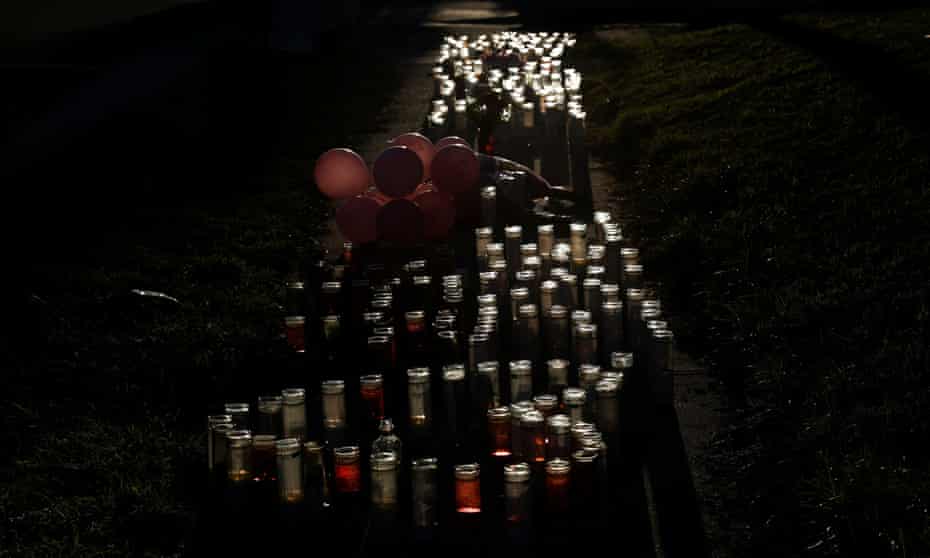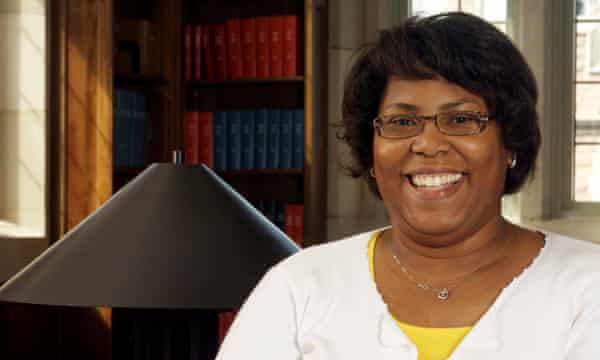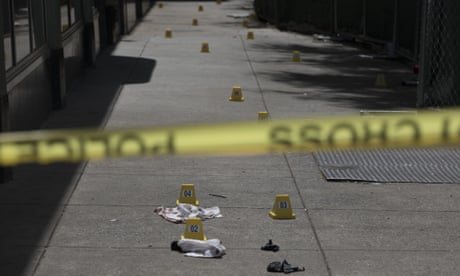Why America overlooks those most hurt by gun violence: ‘Black people are seen as expendable’
Abené Clayton in Los Angeles
Henrika McCoy, an expert on victimization, says timeworn stereotypes prevent real understanding of violent crime in the US

A makeshift memorial near a home where four people were
killed during a birthday party in Inglewood, California, in January.
Photograph: Shannon Stapleton/Reuters
Tue 19 Apr 2022
In the first year of the pandemic, homicides throughout the US increased by 30%, the most dramatic one-year rise since the FBI began keeping crime data.
The increase was driven by a significant rise in gun violence, with shootings ticking up in cities big and small, in states led by Republicans and Democrats alike. Since then, curbing the rise in shootings has become a central topic among candidates vying for midterm election success. It has also prompted policy shifts from mayors across the country and recall challenges for progressive prosecutors in San Francisco and Los Angeles.
As in previous decades, the impact of the rise in violence has been most felt in America’s Black and brown communities. Homicides in 2020 were concentrated among Black Americans who, despite making up 14% of the population, represented more than half of the 2020 victims, according to the FBI data. Gun violence is the leading cause of death for Black males ages 15-34, according to the most recent data from the Centers for Disease Control and Prevention (CDC).
In the first year of the pandemic, homicides throughout the US increased by 30%, the most dramatic one-year rise since the FBI began keeping crime data.
The increase was driven by a significant rise in gun violence, with shootings ticking up in cities big and small, in states led by Republicans and Democrats alike. Since then, curbing the rise in shootings has become a central topic among candidates vying for midterm election success. It has also prompted policy shifts from mayors across the country and recall challenges for progressive prosecutors in San Francisco and Los Angeles.
As in previous decades, the impact of the rise in violence has been most felt in America’s Black and brown communities. Homicides in 2020 were concentrated among Black Americans who, despite making up 14% of the population, represented more than half of the 2020 victims, according to the FBI data. Gun violence is the leading cause of death for Black males ages 15-34, according to the most recent data from the Centers for Disease Control and Prevention (CDC).
More often than not, people think that if something happened to us, we deserved itHenrika McCoy
And yet media coverage of the gun violence crisis still rarely acknowledges Black and Latino men as its primary victims. Meanwhile, academics and activists alike warn that tough-on-crime policies heralded by some as a response will only serve to criminalize the same people who deal with the most loss of life and community trauma.
The Guardian spoke with Henrika McCoy, a social worker in Chicago and associate professor at the Jane Addams College of Social Work.
McCoy researches victimization among young Black men and boys and hopes that an increased focus on the violence Black people face can help expand the public’s perception of who a victim is. She argues that racist stereotypes contribute to the idea that Black homicide victims, especially if they’re young and male, don’t merit the same level of compassion as white victims. “We don’t, as a group, harken a lot of sympathy,” McCoy says of Black Americans. “So more often than not, people think that if something happened to us, we deserved it.”
Though Black and Latino people are more likely to be victims and survivors of violence, it seems that the traditional face of crime victimhood is still quite white and conservative. Why is that?
I think the overarching reason Black victims are overlooked is that it’s assumed that Black people are expendable. So when violence happens to us, it doesn’t matter. It should be something that is expected. This country was founded on expending Black bodies to the benefit of forwarding a country. So, from the beginning, our losses of life haven’t held the same weight. And as a group we don’t garner a lot of sympathy because more often than not, people assume: “Well, they were probably doing something anyway. So why should we care?” People assume that we must have done something for harm to happen to us, even though we know that predominantly that is not true.
Have you seen a shift in the perception that Black and Latino crime survivors are deserving of compassion and attention?
That’s complicated. What has shifted is that there are more people talking about their experiences. And because of that, people who aren’t as close to the issue get to see more, which seems big because, for them, these are new voices. But I don’t think the stories are new and the number of current voices are nowhere commensurate to the actual number of incidents that happen. I just think that some of them are harder to avoid. Still, people find a way to minimize what happened as well as its impact on communities.

Henrika McCoy. Photograph: Henrika McCoy
What do officials and the public miss out on when the stories of Black people who have dealt with violence first-hand are obscured?
I think the young Black and brown men who experience this victimization miss out on a range of things, from being able to develop relationships that provide a safe haven to creating positive relationships.
On a more societal level, we are not built for repetitive trauma, so we end up forgetting that the homicide victim we’re reading about is a person. We end up assuming that since this happens every day, it doesn’t have a real impact in communities. By making that assumption, we give ourselves permission to not try to understand or to be engaged and be involved. I understand that we all need a break from devastating news, but if you can’t hear a story and understand where humans are involved, we have a problem.
Finally, elevating the voices and experiences of people in the communities where gun violence happens most can help officials look at this issue and see how it overlaps and intersects with broader pieces of the puzzle, like child welfare and the juvenile legal system.
Often, when I interview Black parents after their child was shot and killed, they emphasize that their child didn’t deserve what happened to them. Why do you think that is?
We know in this society that if you see someone who’s Black and male, stereotypes that aren’t true are automatically piled on to them. So often there’s this justification, that because these are young people who may have done something wrong at one point in their lives, they’re not allowed to move on from certain stereotypes. And it seems that some people receive forgiveness and opportunities to grow and other people don’t.

Why America’s obsession with a suspect’s rap sheet misses the point
So when we see parents crying on the news, it’s because they know they have to fight the existing stereotypes that are piled on. I think it’s a reflex. People feel like if they don’t tell the world that their child was loved and didn’t deserve to be killed, they will just be another Black kid who did something wrong and doesn’t matter.
On the flip side, what can the perspectives of the most underrepresented crime survivors teach people?
When we hear from families of homicide victims, we can begin to understand whose life we lost. Just because they’re Black or brown doesn’t mean they didn’t have anything to contribute. We have to know who those individuals were, and that they contributed something. Everybody contributes something to the world. This person could have been a brilliant student or a talented musician and neighborhood volunteer.
We can also begin to ask ourselves what we could have changed in the life of the person who shot them. Did the suspect in a drive-by whose sibling was killed and they were angry but never received the therapeutic services they needed, so they took out a gun?
Finally, what needs to be done to change the perception of Black homicide victims and crime survivors so their experiences are given the same weight as those of white and affluent victims?
I was working on a manuscript about the world 400 years from now. Kids are sitting in a school and gun violence seems foreign to them. Everything that we’re talking about in terms of racism, structural racism and social terms is foreign to them. They are shocked when they see the news coverage and read stories about what happened. And I thought to myself, “Well, what would it take to get there?” And I honestly don’t know. I don’t think it’ll happen in my lifetime, and that’s sad to say, but I just don’t. I think the goal is to figure out how we can help inch it forward.
What do officials and the public miss out on when the stories of Black people who have dealt with violence first-hand are obscured?
I think the young Black and brown men who experience this victimization miss out on a range of things, from being able to develop relationships that provide a safe haven to creating positive relationships.
On a more societal level, we are not built for repetitive trauma, so we end up forgetting that the homicide victim we’re reading about is a person. We end up assuming that since this happens every day, it doesn’t have a real impact in communities. By making that assumption, we give ourselves permission to not try to understand or to be engaged and be involved. I understand that we all need a break from devastating news, but if you can’t hear a story and understand where humans are involved, we have a problem.
Finally, elevating the voices and experiences of people in the communities where gun violence happens most can help officials look at this issue and see how it overlaps and intersects with broader pieces of the puzzle, like child welfare and the juvenile legal system.
Often, when I interview Black parents after their child was shot and killed, they emphasize that their child didn’t deserve what happened to them. Why do you think that is?
We know in this society that if you see someone who’s Black and male, stereotypes that aren’t true are automatically piled on to them. So often there’s this justification, that because these are young people who may have done something wrong at one point in their lives, they’re not allowed to move on from certain stereotypes. And it seems that some people receive forgiveness and opportunities to grow and other people don’t.

Why America’s obsession with a suspect’s rap sheet misses the point
So when we see parents crying on the news, it’s because they know they have to fight the existing stereotypes that are piled on. I think it’s a reflex. People feel like if they don’t tell the world that their child was loved and didn’t deserve to be killed, they will just be another Black kid who did something wrong and doesn’t matter.
On the flip side, what can the perspectives of the most underrepresented crime survivors teach people?
When we hear from families of homicide victims, we can begin to understand whose life we lost. Just because they’re Black or brown doesn’t mean they didn’t have anything to contribute. We have to know who those individuals were, and that they contributed something. Everybody contributes something to the world. This person could have been a brilliant student or a talented musician and neighborhood volunteer.
We can also begin to ask ourselves what we could have changed in the life of the person who shot them. Did the suspect in a drive-by whose sibling was killed and they were angry but never received the therapeutic services they needed, so they took out a gun?
Finally, what needs to be done to change the perception of Black homicide victims and crime survivors so their experiences are given the same weight as those of white and affluent victims?
I was working on a manuscript about the world 400 years from now. Kids are sitting in a school and gun violence seems foreign to them. Everything that we’re talking about in terms of racism, structural racism and social terms is foreign to them. They are shocked when they see the news coverage and read stories about what happened. And I thought to myself, “Well, what would it take to get there?” And I honestly don’t know. I don’t think it’ll happen in my lifetime, and that’s sad to say, but I just don’t. I think the goal is to figure out how we can help inch it forward.
No comments:
Post a Comment